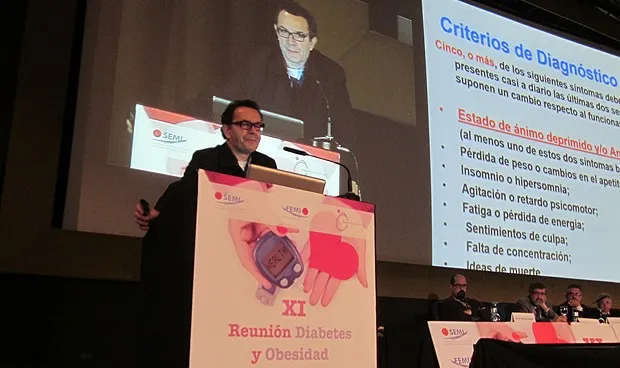Women with diabetes are more prone to clinical depression than men with the same disease, as deduced from most scientific literature in this regard, which rarely provides a study in which the reverse phenomenon is observed or in thethat gender differences are not found in that regard.
This is one of the observations carried out by French Formiga, of the Internal Medicine Service of the Bellvitge Hospital in Barcelona, during its speech in the forum organized in Malaga the Diabetes and Obesity Group of the Spanish Society of Internal Medicine (SEMI).
Beyond this difference that the published studies reveal, Formiga has accent on the "bidirectional" character of the depressive syndrome in diabetic disease (at least ten, only in 2006, they clearly relate both diseases), a controversial point as it demonstratesMore than one replica that took place between the auditorium during the question shift.
"Obviously, if there are diabetes and its complications such as renal failure or peripheral neuropathy, there are also more likely to depression," he reflected.However, "the beautiful thing would be to warn the opposite phenomenon: that it is depression that induces diabetes," he emphasizes.
Another complication: infections in the oral cavity
On the other hand, stomatologist José López, of the Faculty of Medicine and Health Sciences of the University of Barcelona L'Hospitalet de Llobregat, has analyzed another complication from which it is not ruled out that, like depression, impact ofBidirectional form with diabetes: infections of oral cavity.
"In the case of caries, for example, as long as it does not progress beyond dentin and enamel, it is not related to diabetes or any other systemic disease," he said.
"However, there are studies that do find that association, but it would be in any case due to their greater predisposition to periodontal disease or the medications they eat to control the disease," he explained.
As for periapical pathology, it can lead to blood bacteria being released in blood and that, in the long term, favors diabetic disease.
"This periapical disease, together with the periodontal, gives rise to osteolysis in the tooth and metabolic alterations in patients with poorly controlled diabetes," he said."In an essay, the greater or lesser incidence of these pathologies was tested depending on whether or not to suffer from diabetic disease," he reveals.
But also smoking, osteoporosis or other diseases prove the release of bacteria to the bloodstream related to oral cavity, as recalled.
Another complication that dentists see in patients with diabetes is related to salivation: "Some authors defend that, in the saliva of the diabetics, there is a different composition than that of the healthy population that contributes to worsen their oral health," he says.
Finally, the dentists "see a pathology that we call‘ burning mouth ’, a kind of ardor that does not improve or know what to attribute, more frequent if there are diabetes."


